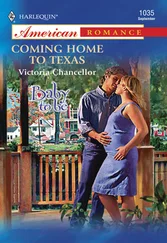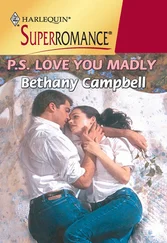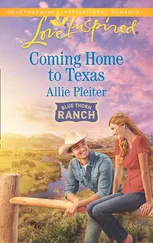Lynn nodded ruefully at the defaced garage doors. “Sorry about the graffiti. Sam was going to paint over it last Sunday, but we had an emergency. All three dogs met a skunk. Yuck.”
“It’s all right,” Tara said. “I’ll take care of it. You’ve done more than enough for us.”
“You may not feel so charitable when you see your decor.” Lynn rolled her eyes. “It’s only a mix of cast-offs and garage-sale bargains.”
Tara patted Del’s back and smiled. “It’ll be fine.”
She’d sold most of the furniture she’d had in California. She didn’t want the memories.
But the few good pieces she’d kept were coming, and their books, kitchen things, odds and ends. The man at the moving company said it was such a small lot, he’d have to squeeze it onto a truck headed that way with other loads, other stops. In the meantime, their possessions were in storage and might not arrive for weeks.
Tara didn’t mind. She’d lived in nearly bare houses before. She’d told Del it would be like camping out. He’d thought it sounded like fun—then.
Her horse and Del’s pony, their saddles and tack, would be brought by a man who moved horses for his living, Garth Gardner. Tara had known him for years and trusted him implicitly. But he, too, had a full schedule, and the horses were not due to arrive for almost a month.
When Lynn learned all this, she’d insisted on furnishing the house temporarily, even if the furnishings were few and haphazard.
“You’re going to feel like you’re living in a thrift store.” She gave a sigh. “Not even a good thrift store.”
She tunneled into the back pocket of her jeans and brought out a jingling brass ring. “Well, are you ready? Here they are, the keys to the castle.”
“I’m ready.” Tara took them, and they felt as weighty as her responsibility to her son. And to her brother.
AT THE DOUBLE C, Grady half limped up the stairs of the back porch.
He’d walked a long way and had picked up a stone bruise.
But he forgot the pain as he reached the top stair and his eyes caught the familiar vista of his uncle’s rolling land. J.T.’s spread looked good to him, mighty good.
The hills loosed a throng of memories that tried to force themselves into Grady’s mind. He blocked them expertly, as if they were gate crashers trying to storm an inner place he’d long fought to keep private.
Grady didn’t like to think much about either the distant past or the far future. He’d tried to live like a bird in flight, soaring in the present moment—but it had been harder to do of late. And he had to admit this particular present moment wasn’t so good, pride-wise.
Suck it up, he told himself. His father wouldn’t be happy to see him, but he’d take him in. Somebody had said that, right? Home is where they have to take you in.
So he raised his fist and knocked at the door. He gazed at the countryside from the top of the porch. And he remembered in spite of himself.
How many years since he’d chased Lynn McKinney up these very stairs, brandishing a garter snake at her? And she’d stopped on the top step, wheeled around and bloodied his nose—for scaring the snake. God, he’d been fond of J.T. and his wife and three kids. He’d thought the Hill Country would be home forever.
Don’t think of that. Don’t think of those days.
He started to knock again, but the door swung open. His father stood there, staring at him like he was a freshly delivered bad surprise. He supposed he was.
“Hi, Dad,” he said. A smile sprang to his lips because in his heart he was glad to see the old man, even if the feeling wasn’t mutual.
He hadn’t set eyes on his father for two years, not since the funeral. They’d had words then. They’d had few since. Grady phoned once in a while, but the old man never had much to say. Well, two years was a long time, and Grady had never been one to hold a grudge.
As for the old man, although he looked perplexed and displeased, he didn’t actually look old. He looked a lot better than he had at the funeral, where he’d been worn and ashen as a zombie. He looked strong again, like his old self.
So Grady nodded in approval and said, “You’re looking good.” He meant it.
His father’s dark eyes looked him up and down. They had a spark of their old fire. “To what do we owe this honor?”
Grady cocked his hat back. “I heard you were in Crystal Creek. I was passing through. I was going to stop and see you.” He grinned. “But my truck stopped about eight miles before I did.”
“Oh, hell,” his father said and swung the screen door open with a sort of stoic resignation. “Come on in.”
Grady entered the kitchen, lugging his duffel bag. The scent of spicy beef hit him like a whiff from heaven. “Lord, that smells fine,” he said. “Am I invited for supper?”
“I suppose,” Bret said in the same weary tone.
“Good to see you again,” Grady said and offered his hand. Bret took it and initiated a contest of who could squeeze the hardest. Grady let him win, dropped his duffel bag to the floor and turned to Jonah, who stood by the window.
For a second Grady’s heart took a strange, flying vault. Looking into Jonah’s eyes was like plunging backward in time and staring into their mother’s eyes. Nostalgia pierced him like an arrow through the chest.
“Little brother,” he said with genuine affection and embraced Jonah. Good Lord, the kid didn’t look like a kid anymore; his even features had lost their last trace of boyishness.
Jonah accepted the embrace awkwardly. Like their father, he was embarrassed by emotional displays. But unlike their father, he was not judgmental. Once you were in the circle of Jonah’s affection, the devil himself couldn’t pry you loose.
Jonah mumbled, “Good to see you.”
Grady disengaged himself and punched his brother’s shoulder affably. He faced his father again. “Okay if I spend a couple nights? I don’t know how long my truck’s gonna be out of commission.”
“I suppose.” Bret’s mouth was grim. “Where you heading this time?”
“A spread down in Florida,” Grady said. “Via New Orleans.”
“What’s in New Orleans?”
“That’s what I aim to see,” Grady said, keeping his real reason to himself. He gave his brother’s shoulder another punch. “You want to come, kid? Those French Quarter gals would love you.”
Jonah’s handsome face darkened in a blush, but he smiled.
“Jonah’s got a job here,” Bret said emphatically. “A steady job. And his dissertation to finish.”
“Dissertation.” Grady eyed Jonah with playful pride. “A doctor in the family. How’s it goin’?”
“Okay.” The same little smile stayed, playing at the corner of Jonah’s mouth. He seemed truly pleased to see Grady.
Bret wished he could feel the same easy pleasure. But his emotions were rent in two as he studied his two sons, the youngest and the eldest.
He wondered how he had gone so right with one, so wrong with the other. There was Jonah, as dependable as gravity, marked for certain success. And there, on the other hand, was Grady.
Grady wasn’t as tall as Jonah, and his good looks were more rugged. His hair was almost black, his skin was tawny, and his eyes, like Bret’s own, were as dark as strong coffee. When he flashed that killer smile of his, weak women melted. Hell, even strong ones melted.
And Grady liked to melt them. He was used to it. He had charm, and Bret believed it was his undoing. Everything had always come easy to him, so he had never had to apply himself to anything.
Grady was in his prime—thirty-five years old—and he had not accomplished one blasted thing in his life. The fates had given him every gift. He was smart—his test scores in school had proved it. But he’d dropped out of school when he was seventeen and hit the road.
Читать дальше












